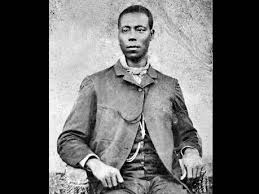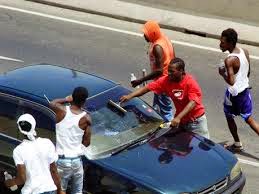The white man was aided and abetted in getting us to this side of the world. He went in with shiny baubles and found willing helpers all along the west coast of Africa. Slavery, we were taught, was not new in the motherland. Triumphant tribes dominated hapless members of the defeated tribe and put them to work. When pale skinned humans on huge boats showed up on Her shores, armed and heavy laden with trinkets, it would seem that our brothers thought little of handing their own conquests over to these strangers in exchange for bounty from the strangers.
 |
| Accurate representation of what happened in West Africa or not? |
Those of us who survived the horror of the Middle Passage and the rough initiation into work and torture and rape and destruction of familial ties on the Pale Skinned’s plantations were about to face yet another betrayal. Some intrepid warrior-slaves fled the plantations in Jamaica and headed for the hills. In that mountainous, beautiful terrain, communities of these braves lived and hid and warred with the British militia. Their survival was due in large part to their own skill at bush and jungle war craft. Legendary members of this mountain community live on today in poems and stories of their exploits: Tacky the Chieftain, Three Finger Jack and Nanny of the Maroons, herself a national hero of Jamaica.
Jamaican Maroons are often described as enslaved Africans and persons of noticeable African descent who ran away or escaped from their masters or owners to acquire and preserve their freedom.
But their survival was also due to agreements that they made with the British. These fearless braves secured their own survival at the expense of other runaway slaves who were seeking a way out of slavery and who also headed for the hills. They handed over these their brethren to the British as a peace offering.
 |
| What was the full story of the Maroons and their relationship with the British? |
Consider too the story of another one of Jamaica’s national heroes, Paul Bogle. Paul Bogle led a protest against harsh economic conditions. He marched with a throng to the courthouse in Morant Bay. The British authorities of the day there panicked, responded with undue force, and it was at this stage that the protest morphed into a rebellion. Lives were lost in the upheaval. And the Maroons were the ones who captured Bogle and handed him over to the British. Paul Bogle was hanged the very next day.
 |
| Paul Bogle, National Hero |
To be sure, there is great controversy today over Maroon history in Jamaica. I certainly do not have the answers. And I am mindful of the absolutely true sentiment:““Until lions have their historians, tales of the hunt shall always glorify the hunter”.
Still I ask: what role did our own really play in our history, in our enslavement by Europeans, in our forced journey to the west?
Any discussions about the evils of slavery and its reverberations right into 2015 society must contemplate this question. I do not pose this question in a bid to excuse the white man or to in any way diminish what he did. The white man was the architect of this evil scheme to enrich himself and his own homeland at the expense of the lives, culture and humanity of the peoples of Africa. But full resolution never happens outside of the anything the full truth. The truth in all its uncomfortable, awkward glory is what I seek.
We were heading towards Downtown Kingston yesterday, H and I. It was a rare occasion that found us traveling together to work. I had just dropped my own car at the dealer for servicing and he graciously consented to pick me up there and drop me to work. The courtesy shuttle offered by the dealer would have seen me getting to office perilously close to 9:30am when I had a scheduled meeting. In the vicinity of Three Miles, the usual swarm of windscreen wipers made their way hungrily through the throttling cars in the traffic. Every single morning, I, the lone person, the lone female in my car tell them “NO”. They beg, they press up against my window, they beg some more, I keep saying “NO.” They approached H’s big, black, heavily tinted truck. He barely shook his head indicating no, he opened not his mouth, they didn’t miss a beat and kept moving right along. I cussed and railed. These windscreen wipers had obviously looked at my sex and my car and decided that they would try with all their might to extract money from me. Their quest for money was not based on the principle of “I need, they all have, let me beg all.” Their quest for money was selective, based on who they perceived was a soft touch and who had money to give them.
Is the quest for reparations fair then? Peoples of African descent this side of the world justifiably seek reparations from former European slavers and colonisers, not unlike the Jews seeking (and getting) restitution from Germany as a result of the Holocaust. But without answers to the question of the role of our African brothers in Africa getting us onto the white man’s slave ships, and without answers to the role of the Maroons in our own history here in Jamaica, is our demand for reparations really based on principle? Are we merely going where we think the money is?
Look, I don’t know the facts. There are people who have offered reasonable explanations about the role of Africans in the slave trade. I also know that Africa is not a country. But I think that political boundaries notwithstanding, there ought to be a natural unity amongst the black peoples of Africa. I also know that the Maroons were a source of trouble for the British slavers and colonizers, killing, marauding, burning and destabilizing the government and structures of the day. They also inspired many of their African brethren with their radical bravery and cunning against the establishment.
But, I am not convinced that we have answered head-on the question I posed earlier: what role did our own really play in our history, in our enslavement by Europeans, in our forced journey to the west?
I want to know.

